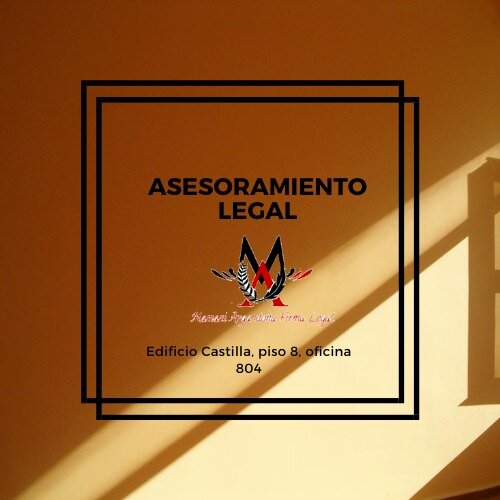Best Investment Lawyers in La Paz
Share your needs with us, get contacted by law firms.
Free. Takes 2 min.
List of the best lawyers in La Paz, Bolivia
About Investment Law in La Paz, Bolivia
Investment in La Paz, Bolivia, is a growing avenue for both local and international investors. The city is not only the administrative capital of the country but also a hub for economic activity. Bolivia's investment framework is governed by laws that seek to protect both property rights and foreign investments. Bolivia offers a range of sectors for investment, including natural resources, agriculture, and infrastructure development. The government's main objective is to foster economic growth by providing a secure and appealing environment for investors.
Why You May Need a Lawyer
Investing in La Paz, Bolivia, can be complex due to the layers of legal considerations involved. A lawyer familiar with Bolivian investment law is beneficial in situations such as:
- Understanding and navigating local regulations and compliance requirements.
- Drafting, reviewing, or negotiating contracts and agreements.
- Handling property acquisition and ensuring proper registration.
- Resolving disputes related to investment or commercial activities.
- Advising on tax implications and assisting in financial planning.
- Managing mergers, acquisitions, or joint ventures involving local entities.
Local Laws Overview
Bolivian investment law is governed by several key pieces of legislation designed to promote and protect investment. These include:
- Investment Promotion Law: Enacted to stimulate national and foreign investment, providing clarity and security.
- Property and Ownership Laws: These laws ensure that property rights are respected and enforced.
- Labor Laws: There are specific guidelines for hiring practices, labor contracts, and employee rights.
- Tax Regulations: Including incentives and fiscal obligations for investors, which need careful navigation to ensure compliance.
- Dispute Resolution Mechanisms: Bolivia provides recourse through local arbitration and judicial processes for resolving investment disputes.
Frequently Asked Questions
What is the process for foreign investors to start a business in La Paz?
Foreign investors must register their business, obtain the necessary licenses, and comply with local labor and tax regulations. Legal advice is recommended to streamline the process.
Are there sectors where foreign investment is restricted in Bolivia?
Yes, specific sectors such as national defense and certain natural resources are subject to restrictions and oversight.
How are investments protected under Bolivian law?
The Bolivian constitution and specific investment laws provide protections, including property rights and free remittance of profits.
What tax incentives are available for investors in La Paz?
Bolivia offers tax breaks and incentives in strategic sectors like renewable energy and infrastructure development. Consulting a tax professional is advised for tailored advice.
How does the government promote investment in Bolivia?
Bolivia's government promotes investment through laws that provide guarantees, incentives, and improved infrastructure.
Can foreign investors own real estate in La Paz?
Yes, foreign investors can acquire property, but must ensure compliance with both national and local regulations.
What are the common legal issues faced by investors?
Common issues include contract disputes, tax compliance challenges, and property rights enforcement.
How do I resolve a legal dispute related to my investment?
Legal disputes can be resolved via local courts or arbitration. A lawyer can provide guidance on the best approach based on the specifics of the case.
Is there a minimum investment amount required for foreign investors?
Bolivia does not impose a minimum investment amount, but sector-specific regulations may apply.
How does currency exchange work for businesses in Bolivia?
The Central Bank of Bolivia manages currency exchange policies. Legal consultation will help navigate specific regulations affecting foreign investors.
Additional Resources
For more information, you may find it helpful to consult the following resources:
- The Bolivian Ministry of Economy and Public Finance for official economic and investment guidelines.
- The Chamber of Commerce of La Paz provides networking opportunities and local business insights.
- Law firms specializing in investment and commercial law for tailored legal advice.
Next Steps
If you require legal assistance for your investment in La Paz, Bolivia, consider the following steps:
- Research and identify reputable law firms with expertise in Bolivian investment law.
- Schedule a consultation to discuss your specific needs and investment goals.
- Prepare relevant documents and information to streamline the consultation process.
- Consider ongoing legal counsel to ensure compliance and address issues proactively.
Remember, seeking professional legal advice can save time and resources by preventing potential legal pitfalls.
Lawzana helps you find the best lawyers and law firms in La Paz through a curated and pre-screened list of qualified legal professionals. Our platform offers rankings and detailed profiles of attorneys and law firms, allowing you to compare based on practice areas, including Investment, experience, and client feedback.
Each profile includes a description of the firm's areas of practice, client reviews, team members and partners, year of establishment, spoken languages, office locations, contact information, social media presence, and any published articles or resources. Most firms on our platform speak English and are experienced in both local and international legal matters.
Get a quote from top-rated law firms in La Paz, Bolivia — quickly, securely, and without unnecessary hassle.
Disclaimer:
The information provided on this page is for general informational purposes only and does not constitute legal advice. While we strive to ensure the accuracy and relevance of the content, legal information may change over time, and interpretations of the law can vary. You should always consult with a qualified legal professional for advice specific to your situation.
We disclaim all liability for actions taken or not taken based on the content of this page. If you believe any information is incorrect or outdated, please contact us, and we will review and update it where appropriate.









